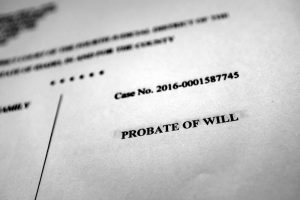Comprehensive Roadmap to Probate a Will in New Jersey
An Experienced Estate Planning Lawyer Can Help You Deal with the Probate Process After a Loved One’s Passing
 When a loved one passes, your life can turn upside down. Amidst the grief, you must take care of the paperwork, collect your loved one’s possessions and attend to numerous other tasks that may seem overwhelming at the time. As soon as someone dies, their belongings and bills become part of an estate. If they left a will, the person named in the will as executor typically handles the estate. One of the many obligations of handling an estate is probating the deceased person’s will. Probate is a court process that allows the property of the decedent, or deceased person, to go to the heirs named in the will. Typically, wills go through probate, but it depends on how much is in the estate. Like many legal procedures, probate matters can be confusing, especially for one grieving loss. Thus, it is beneficial to seek legal help. A probate lawyer can outline and discuss the details of your probate process during your first consultation.
When a loved one passes, your life can turn upside down. Amidst the grief, you must take care of the paperwork, collect your loved one’s possessions and attend to numerous other tasks that may seem overwhelming at the time. As soon as someone dies, their belongings and bills become part of an estate. If they left a will, the person named in the will as executor typically handles the estate. One of the many obligations of handling an estate is probating the deceased person’s will. Probate is a court process that allows the property of the decedent, or deceased person, to go to the heirs named in the will. Typically, wills go through probate, but it depends on how much is in the estate. Like many legal procedures, probate matters can be confusing, especially for one grieving loss. Thus, it is beneficial to seek legal help. A probate lawyer can outline and discuss the details of your probate process during your first consultation.
The Main Steps to Probate in New Jersey
It begins with the petition and accompanying documents to give the interested parties notice of the probate. Probate can begin no earlier than ten days after the date of the decedent’s death. Then the validation of the will occurs, followed by the issuance of Letters of Testamentary or Administration. After, the executor submits a preliminary inventory to the court, while a waiting period for creditors to make claims expires, including taxing authorities. Then, the executor files the final inventory, and the court issues an order of probate, which is the final document allowing the executor to transfer property to the beneficiaries.
Make Sure the Will is Valid
Even before the court issues any documents or the process begins, the will’s validity is confirmed. Wills must have specific provisions and legal requirements for them to be valid. For example, a valid will has two disinterested (non-heirs) people who sign as witnesses to the will or is notarized. It could also be part of the state’s will registry. If notarized, the court does not have to verify the decedent’s signature through the witnesses, but the will may not be valid if there are no witnesses and notarization. In that case, the probate becomes an estate administration rather than will probate. Though the process is essentially the same, except for the names of documents, the big difference is that the law designates the heirs, those who inherit the estate, not the decedent.
Determine the Appropriate Roles
Probate starts formally with a petition for probate, a court form that names the decedent, the person named in the will as executor or one who the court designates as the Personal Representative (PR) of the estate, and other statistical information about birth, death, assets, debts, and heirs. The person that fills out and signs the court paperwork to complete the probate process pays estate creditors, obtains authorizing letters of probate to allow them to pay creditors and open bank accounts, and eventually pays the beneficiaries named in the will is the PR of the estate. The beneficiaries are typically the decedent’s heirs, spouse, children, or other relatives. However, sometimes people leave their property to people other than heirs or entities, such as charities.
Have the Right Paperwork and Authorization
Then there are the necessary documents in the initial phases of the process. The probate process begins with filing a petition in the Surrogate Court in the county of the decedent’s residence. The first order of probate is to obtain Letters of Testamentary for the estate executor if one is named. Otherwise, the court can name a relative or entity, such as a trust company or bank, to represent the estate. The Letters authorize the PR to sign and otherwise transfer property of the estate to complete the probate.
 Handling the Finances
Handling the Finances
The executor or PR gathers all of the decedent’s property during the initial inventory phase. This is basically the process of itemizing and valuing all of the assets contained in the estate. Then, the executor pays the bills, the taxes, fees, and satisfies any outstanding financial obligations that the person had before their death. For example, if a mortgage payment needs payment from the decedent’s bank account, the Letters allow the PR to open an account in the name of the estate and pay the mortgage to preserve the asset, a home, rental, or other property. Other bills may include funeral expenses, credit cards, court costs, and estate taxes. Once the final inventory has passed court muster, the PR distributes the remaining assets to the heirs under the supervision of the court.
Do You Have to Probate a Will in New Jersey?
No one can transfer or sell some or all the decedent’s property without probating a will. For example, you cannot legally sell your loved one’s car after they die because the title is in the deceased person’s name, and they cannot sign official motor vehicle documents to transfer the vehicle. As such, you must probate or administer an estate that does not qualify as a small estate or has items other than those that pass directly to beneficiaries. Since you must know which forms to file and when in conformity with court rules, you are best served in successfully executing the process with the help of an experienced probate lawyer.
Can You Avoid NJ Probate after Someone Dies?
It is possible to avoid probate in New Jersey, but only in very specific cases. Estates valued at equal to or less than $20,000.00 are small estates that do not need to go through probate if the surviving spouse or partner is the sole beneficiary. Otherwise, estates valued at $10,000.00 or less with only one heir and the consent of other potential heirs is another small estate that avoids probate (N.J.S.A. 3B:3-22 et seq). Finally, property and assets included in a revocable living trust do not go through probate.
Items that can Pass without Probate
Other items that do not need probate to transfer to the heirs are real property holdings with title in joint tenancy with a right to survivorship or tenancy by the entirety. The property with either designation on the title documents goes directly to the surviving party or parties named in the title. Likewise, insurance policies or retirement savings with beneficiaries and bank accounts with named beneficiaries and payable on death designations. Other than items that pass without probate, a decedent’s possessions, like jewelry, clothing, furniture, and vehicles, real estate holdings not held in joint tenancy with survivorship or tenancy by the entirety, and any other property go through probate.
Time Expectancy to Probate a Will in New Jersey
Regardless of whether a decedent had a will or not, it typically takes approximately a year to complete. However, the complexity and time frame for a probate process are directly correlated. In other words, a more complicated, larger, or largely disorganized estate can require more time to successfully probate it.
Get Trusted Counsel on Probate Matters in New Jersey
Bronzino Law Firm can guide you, as executor or administrator, through each step of the process and answer questions you or other beneficiaries may have about the probate process and New Jersey’s estate laws. Contact us at (732) 812-3102 or connect with us online to speak with a New Jersey probate attorney free of charge about the complexities of probating a will after a loved one has passed. We are here to answer all of your questions, address your concerns, and assist with the estate administration burden that may be weighing on your mind in Little Silver, Red Bank, Eatontown, Barnegat, Toms River, Lacey, and other communities in Monmouth and Ocean County.


 Handling the Finances
Handling the Finances




